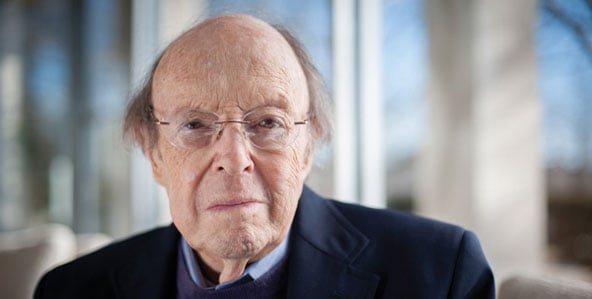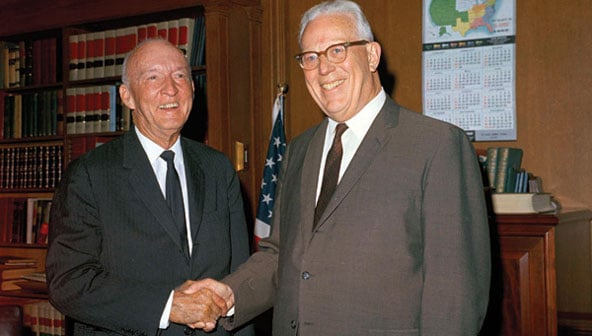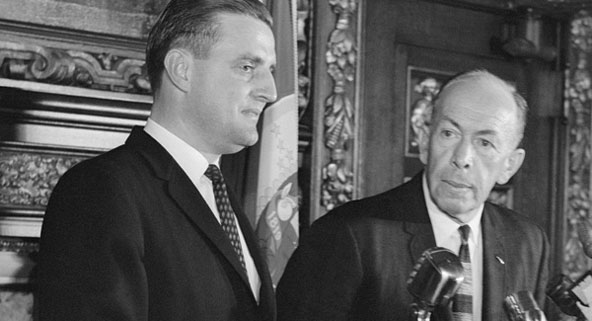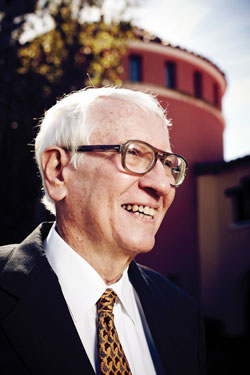Fifty years after Gideon, lawyers still struggle to provide counsel to the indigent

Illustration by Roberto Parada
In June 1962, when the U.S. Supreme Court granted review of the handwritten pauper’s appeal from a Florida inmate named Clarence Earl Gideon, the court correspondent of the New York Times immediately knew he had a good news story on his hands. And, he thought, it was likely to be something more.
The correspondent was Anthony Lewis, then a 35-year-old Harvard graduate in his seventh year covering legal affairs in the Times’ Washington bureau. Even before he got a good look at Gideon’s appeal, in which the man convicted of breaking into and entering a pool hall had sought the aid of a lawyer at his trial, Lewis realized from the Supreme Court’s order that it would consider overruling a key precedent on the provision of counsel to indigent defendants.
Lewis had recently been asked to write a children’s book about the Supreme Court, and his initial thought was that Gideon’s case might make for a good chapter or vignette in such a book. Luckily, for generations of readers, Lewis soon realized that the case was ripe for a full-fledged book of its own. That book was Gideon’s Trumpet, which concisely tells the story of one of the most important criminal justice cases from the era of Chief Justice Earl Warren.
“The case had a lot of things going for it,” says Lewis, who was interviewed in January, two months before the 50th anniversary of the Supreme Court’s eventual decision in Gideon v. Wainwright. “First, how wonderful that it has a biblical name associated with it. And it’s a case about one human being. It’s not hard for anyone to relate to that.”
In its Gideon decision, the justices unanimously overruled a 1942 case, Betts v. Brady, and held that the Sixth Amendment’s guarantee of counsel was a fundamental right made applicable to the states through the 14th Amendment. Justice Hugo L. Black wrote for the court that it was an “obvious truth” that a fair trial for an indigent defendant could not be guaranteed without the assistance of counsel. The “noble ideal” that every defendant “stands equal before the law … cannot be realized if the poor man charged with crime has to face his accusers without a lawyer to assist him,” Black wrote.
Since that opinion—on March 18, 1963—and the publication of Gideon’s Trumpet in 1964, many more words have been published about the legacy of the case for indigent defense in the United States. While the decision is being celebrated on its 50th anniversary, one report after another over the years has documented the nation’s failure to truly live up to the ideal of Gideon.
A year ago, addressing the American Bar Association’s National Summit on Indigent Defense, U.S. Attorney General Eric H. Holder Jr. said that across the country, “public defender offices and other indigent defense providers are underfunded and understaffed. Too often, when legal representation is available to the poor, it’s rendered less effective by insufficient resources, overwhelming caseloads and inadequate oversight.”
In short, Holder said, “the basic rights guaranteed under Gideon have yet to be fully realized.”
Daniel T. Goyette, the chief public defender for Jefferson County in Kentucky, and a member of the ABA’s Standing Committee on Legal Aid and Indigent Defendants, says that “despite some genuine efforts and notable advances, the criminal justice system and, more pointedly, the leadership of our executive, legislative and judicial branches of government—both state and federal —have largely failed to carry out the constitutional mandate of the Gideon decision.”
He adds: “Sadly, it has not been a priority, and we are constantly taking one step forward and two steps back.”

Anthony Lewis, author of Gideon’s Trumpet. Photo by Jared Leeds.
HUMBLE ORIGIN
The story began when Clarence Gideon believed he had a basic right to a lawyer for the felony charge he faced after breaking into and entering the Bay Harbor Pool Room in Panama City, Fla., in June 1961. (Coins were taken from the pool hall’s jukebox and cigarette machine, and some beer and wine was reported missing.)
A state judge turned down Gideon’s request, explaining that state-appointed counsel was a right only in capital cases. In fact, while counsel was guaranteed under the Supreme Court’s 1932 decision in Powell v. Alabama (see “The Saga of the Scottsboro Boys Begins”), the 1942 Betts ruling held that lawyers were provided in other felony cases only when there were “special circumstances,” such as mental disability or illiteracy.
Gideon was 51 when he was convicted; he was sentenced to five years in state prison. As Lewis described him in the book, Gideon “bore the marks of a destitute life: a wrinkled, prematurely aged face, a voice and hands that trembled, a frail body, white hair. He had never been a professional criminal or a man of violence; he just could not seem to settle down to work, and so he had made his way by gambling and occasional thefts.”
Gideon took to the prison library and filed his now-famous, five-page pauper’s appeal claiming that his conviction violated his due process rights under the 14th Amendment. Gideon’s punctuation and spelling were “full of surprises,” as Lewis put it, and he failed to understand that the prevailing law under Betts did not guarantee him counsel without special circumstances. (Despite these faults, there is more recent evidence that Gideon was likely aided in writing his petition by a fellow inmate at the state prison in Raiford, Fla.—a former state judge who had been convicted in a murder plot.)
The Supreme Court, which had been signaling its move to overrule Betts, accepted Gideon’s appeal and appointed distinguished Washington, D.C., lawyer (and future justice) Abe Fortas to represent him before the justices. Lewis, who had decided to go ahead with his book project, had frequent access to Fortas and others at his firm as they prepared Gideon’s high court arguments.
As the book tells it, there was irony in that a defendant who faced all the machinery of the state at his trial without the aid of counsel now had top-notch representation in the highest court in the land, while Florida turned over the defense of its conviction to a young assistant state attorney general, Bruce R. Jacob, whose wife helped type up his legal briefs. (The other assistants in the criminal appeals division had all argued cases before the Supreme Court, and they recognized that the state was probably going to lose.)
“We knew immediately that this would probably be the case that would be used to overturn Betts v. Brady, because Gideon did not allege any special circumstances,” says Jacob, who went on to become a defense attorney and a strong advocate for improving indigent defense.
An effort by Jacob to get other states to file an amicus brief extolling the dangers to federalism of requiring counsel for indigent defendants drew only two supporters (Alabama and North Carolina). Meanwhile, the letter from Jacob prompted a young, up-and-coming politician, Minnesota Attorney General Walter F. Mondale, to organize an amicus from states urging that Betts be overruled. Twenty-three states signed on.
After the Supreme Court ruled in his favor, Gideon was retried in Bay County, Fla. This time, with the aid of a savvy local criminal defense lawyer named W. Fred Turner (after Gideon had stubbornly rejected the help of two attorneys from the American Civil Liberties Union), he was acquitted.
Lewis had the storybook ending for Gideon’s Trumpet. In fact, it would have almost ruined it if Gideon had again been convicted, Lewis says.

U.S. Chief Justice Earl Warren and Justice Hugo Black in 1966. AP Photo.
SUPREME EXPANSION
The Supreme Court went on to expand Gideon’s right to counsel to state juvenile delinquency proceedings, to state misdemeanor proceedings involving sentences of actual imprisonment, to proceedings involving suspended jail sentences, and the first appeal to a state appellate court. In addition, the court has recognized that the right to counsel is required at critical stages of the justice process, such as identification lineups, arraignments, preliminary hearings, plea negotiations and the entry of a guilty plea.
The bill of particulars about how the Gideon decision has failed to live up to its promise is familiar to many of those in the field, at least because each 10-year anniversary brings new lamentations.
A 2004 report by the ABA, Gideon’s Broken Promise: America’s Continuing Quest for Equal Justice (PDF), laid out the top concerns. The chief one is that indigent defense services are not adequately funded, leading to an inability to attract and compensate good lawyers, as well as to pay for experts and investigators. Meanwhile, defenders of the indigent are often inexperienced, fail to maintain proper contact with their clients, or are not competent to provide services that meet ethical standards. And judges sometimes fail to honor the independence of defense counsel and routinely accept representation of indigent defendants that is patently inadequate.
There were more specifics, of course, but the report’s bottom line was that “40 years after Gideon v. Wainwright, indigent defense in the United States remains in a state of crisis, resulting in a system that lacks fundamental fairness and places poor persons at constant risk of wrongful conviction.”
Fast-forward to 2009, and a report of the National Right to Counsel Committee and the Constitution Project found little progress. Despite an overall increase in funding, “inadequate financial support continues to be the single greatest obstacle to delivering ‘competent’ and ‘diligent’ defense representation,” said the report, Justice Denied: America’s Continuing Neglect of Our Constitutional Right to Counsel (PDF).
The most visible sign of such inadequate funding is public defenders with “astonishingly large caseloads,” sometimes more than 100 clients per lawyer at a time. Such lawyers cannot interview their clients properly, file the appropriate motions, investigate their cases, responsibly negotiate with prosecutors, or perform other tasks.
Former Vice President Mondale, who was an honorary co-chair of the project, lamented in a 2009 op-ed essay in the Washington Post that if Clarence Gideon were hauled into court in Florida that year, he might well be denied a public defender because of the state’s limits on assets to qualify as indigent. “Sadly, Gideon’s chances of getting counsel would be worse” in other states, Mondale wrote. Such barriers “effectively work to deny counsel to people who truly cannot afford to hire representation.”
The Justice Denied report had a host of recommendations, including urging states to have a single statewide agency overseeing all aspects of indigent defense, the establishment of workload limits for defense attorneys (a position echoed in multiple reports and principles put forth by the ABA), and, where necessary, the filing of “systemic litigation” over excessive caseloads.
“There’s a lack of political will” for properly providing indigent counsel, says Virginia Sloan, president of the Constitution Project in Washington, D.C. “There are lots of barriers to getting some of these indigent reforms into place.”
This month, another book is coming out about the Gideon case and its legacy, though this one is more journalistic and anecdotal, and it puts more human faces on the issue than the dry policy reports on indigent defense.
In Chasing Gideon: The Elusive Quest for Poor People’s Justice, journalist Karen Houppert focuses on four recent indigent defendants in Florida, Georgia, Louisiana and Washington state and their struggles with getting meaningful legal representation.
She details the story of one Spokane, Wash., public defender who risked a contempt-of-court citation to seek a continuance to have the proper time to prepare for a trial for one of her more than 100 clients. Another chapter examines a raft of challenges for indigent defense in New Orleans, made all the worse by disruption after Hurricane Katrina and a funding crisis that led one judge to appoint high-profile local lawyers, most of them inexperienced in criminal matters, to represent poor defendants in his courtroom.
In the book, Houppert attends a national conference of public defenders and legal aid attorneys, a “motley group” who wear “the resigned look and crumpled clothes of the system’s legal workhorses. No power suits. No Brooks Brothers shirts. No Prada shoes.” It was a group that understood good work was possible in public defense, but “that the greater context in which they labored made it a herculean effort that few could sustain,” she writes.
“There have been many blue-ribbon commissions, and everyone is aware there is this huge crisis in indigent defense, yet not much has happened,” Houppert says in an interview, and adds that her driving question in writing the book was: Why is this so hard to properly fund? Among the answers is that the problem is well-known in the legal community but not among the general public, whose image of the justice system was once shaped by crusading defense lawyers such as Perry Mason and Matlock but is now informed by pro-prosecution shows such as Law & Order and C.S.I.
Some in the academy have begun to question what they view as the traditional liberal outlook on Gideon—that extending it as far as possible should be the goal and more funding is a matter of right.
Donald A. Dripps, a law professor at the University of San Diego, argued in papers prepared for the 50th anniversary that the landmark decision has been both a failure and a paradox.
“It is generally agreed that Gideon was a great decision, yet it is also generally agreed that Gideon was not required by text and history and hasn’t led to effective representation of typical indigent defendants,” he argued in one paper.
“From my perspective, the cost of indigent defense ought to be thought of as part of the cost of criminal justice,” Dripps adds in an interview. “We spend billions on police and prosecutions and prisons but then get pennywise for indigent defense.”
Dripps and others argue that a new way to address the crisis would be to reduce the cost of effective representation for the indigent by increasing the supply and lowering the demand for such services. He proposes that the Supreme Court come up with a rule that would soften the requirement for counsel in felony cases, as long as incarceration was not a possible outcome of a prosecution.
He cites research by Erica J. Hashimoto of the University of Georgia law school showing that felony defendants who represented themselves experienced outcomes that were generally no worse, and were arguably better, than those experienced by indigent defendants with lawyers.
On the supply side, Dripps is joined by Stephanos Bibas, a law professor at the University of Pennsylvania and a former federal prosecutor, in arguing that the bar’s monopoly on representation be loosened.
“Perhaps law schools and colleges could develop shorter paraprofessional training, akin to paralegal courses, to prepare people to handle unemployment compensation, disability claims, uncontested divorces, estate planning and similar specialized tracks,” Bibas says. That would help free up the pool of appointed lawyers for cases of higher complexity, he says.
Bibas also suggests more legal triage to determine which cases really require lawyers. One possibility would be to limit the right to counsel only as far as the Sixth Amendment right to a jury, which covers all felonies and the most serious misdemeanors. Bibas acknowledges that these reforms would require fundamental changes in law, and that they are still the views of a “very small minority” in the academy.
“The prevailing view is that Gideon was this great victory and the political branches are just not cooperating,” Bibas says.
Goyette, the Louisville public defender and ABA committee member, expresses doubt about these more radical ideas. “Unless our justice system is fundamentally changed—and I think that is a dangerous proposition and unlikely to happen—limiting the right to counsel is not a wise approach or a viable solution.”
One idea he favors is the reclassification of some offenses and the diversion of certain cases out of the criminal justice system, which would save money and relieve caseloads.
In June 2011 the Supreme Court issued its latest decision in the Gideon line, holding in Turner v. Rogers that the 14th Amendment’s due process clause does not automatically require a state to provide counsel to an indigent person facing a civil contempt proceeding, even if the person faces incarceration.
The decision was largely a disappointment to the “civil Gideon” movement, the community of advocates who promote the appointment of counsel to indigent litigants in adversarial civil proceedings, particularly when such things as shelter, child custody, health or safety are at stake.
The movement took heart, though, that the high court required increased procedural safeguards in certain such cases. (The 5-4 decision held that a South Carolina man jailed for 12 months for nonpayment of child support should at least have been given alternative procedures that would have notified him that his ability to pay the overdue child support was the critical question in his contempt-of-court case.)
In January, just two months before the 50th anniversary of Gideon, the justices took up their latest criminal case involving indigent defense. The case was Boyer v. Louisiana, a factually messy dispute involving a capital defendant who faced a seven-year delay in being brought to trial, with five of those years awaiting the appointment of qualified state-appointed counsel.
The defendant, Jonathan Edward Boyer, contends in his court papers that the lengthy delay was caused by a “systemic breakdown in the funding of indigent defense” and violated his Sixth Amendment right to a speedy trial. Louisiana contends that the delay was not attributable to the state, and that Boyer always had effective representation. (Louisiana requires indigent capital defendants to receive two specially qualified lawyers.)
The justices wrestled during the Jan. 14 oral arguments with some of the thorny issues related to indigent defense. “Should the state be responsible when the funding problem is at a local level?” Justice Anthony M. Kennedy asked during the argument. And Justice Sonia Sotomayor observed, “In the end, states are always strapped,” but they make choices on how they allocate their criminal justice budgets, and even when they are broke they find ways to “pay the prosecutor.”

Minnesota Attorney General Walter Mondale with Gov. Karl Rolvaag in 1964. Bettmann/Corbis.

Bruce Jacob, who as an assistant attorney general argued Florida’s case. Photo by Richard Adamo.
FIRSTHAND REMEMBRANCES
Observances of the 50th anniversary began last summer and run at least through late spring. Jacob, who is the dean emeritus at Stetson University College of Law in Tampa, Fla., will participate in at least 10 events, he says, including one in May sponsored by the Constitution Project that is celebrating him and three other original participants in the case who are still living: Lewis, Mondale and Abe Krash, who was a co-counsel to Fortas in representing Gideon.
“I feel like a historical relic,” says Jacob.
After winning two Pulitzer Prizes while serving in the Washington bureau of the New York Times, Lewis moved to London in 1964 to become the paper’s bureau chief there. He began writing an op-ed column from there in 1969 before moving back to the United States.
Gideon died in 1972 at age 61, having lived nine mostly uneventful years after his release from prison. Lewis recalls that he phoned the funeral parlor from London to learn the details, and he ended up talking with Gideon’s elderly mother. She was upset with Lewis over a passage in Gideon’s Trumpet, though it was really something Gideon had himself said about his mother’s second husband in a letter about his life that he had written to his Supreme Court lawyers.
Lewis says that he hasn’t followed all the complexities of the Gideon legacy in recent years. “I said in the book that it would take a long time and a lot of difficulty to make representation for the poor a reality,” Lewis says. “I’m not a lawyer and I never had to deal with all the realities of legislative support and so forth. I still look at the issue the way I did when I wrote the book—as an ideal.
“That’s not enough, I know,” he adds. “But you have to have an ideal. And it was the right ideal.”
Mark Walsh is a Washington, D.C.-based freelance writer who regularly reports on the Supreme Court for the ABA Journal.



